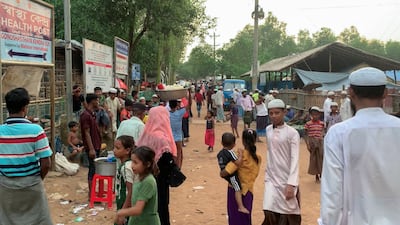The world’s largest refugee camp in Bangladesh has witnessed the death of as many as 24 people in less than four months, police and humanitarian workers said.
The sprawling refugee camps in Cox's Bazar, home to more than a million Rohingya refugees, have become the site for deadly turf wars, extra-judicial killings and arson attacks.
According to local reports citing police officials, a group of assailants in Nayapara refugee camp attacked the house of a Rohingya community leader, Monira Begum, on April 25.
Her 30-year-old sister Jamila Begum was shot dead and Monira and her daughter are in hospital with serious injuries.
Mahfuzul Islam, superintendent of police at Cox's Bazar, told The National that the police are investigating the murder to confirm whether it was a targeted killing.
“We cannot confirm at the moment whether she was targeted or got in the crossfire of a gang fight,” he said.
Mr Islam said gang wars are becoming a big security threat in the camps and gang members are involved in kidnappings, extortion, arson, drug trafficking and murder.
“Between 2017 and December 2022, more than 116 killings took place inside the camps," he said.
“This year alone, there were about 24 murders."
There are 11 active armed groups in the Rohingya refugee camps, according to a report by the Bangladeshi Defence Ministry published in February, including the Arakan Rohingya Salvation Army and the Rohingya Solidarity Organisation, which are among the most dominant groups spreading terror.

A government investigation recently found that a fire that broke out in the refugee camp and left hundreds homeless was "a planned act of sabotage" by criminal gangs. Of the 222 fires in the camps in 2021 and 2022, 60 were found to be the result of arson attacks.
Mr Islam said the threat has intensified in the past few months.
“Gangs have bigger muscle power and they are better armed. The refugee camps are adjacent to the border with Myanmar and they are smuggling weapons,” he said.
'We live in fear'
There are 30 camps in Cox’s Bazar, home to more than 1.2 million Rohingya, a stateless ethnic Muslim minority from Myanmar’s Rakhine state. More than 750,000 were forced to flee a military-led genocide in 2017.
Many Rohingya refugees said their lives have become unbearable in the camps due to the violence and killings.
Htway Lwin, a Rohingya community leader and human rights activist told The National that he is a target.
“The criminals mostly target majhi, or camp leaders, who advocate for repatriation and oppose crimes in the camp," he said.
"I am one of them because of my work. I have witnessed dead bodies, including those of our well-known leader Muhib Ullah."
Ullah, 48, who led the Arakan Rohingya Society for Peace and Human Rights, was shot dead in September 2021.
On October 16, 2022, criminals hacked to death Maulvi Mohammad Yunus, 38, leader of Camp 13. Mohammad Anwar, 38, another community leader was murdered the same day.
“They will come after me too. I had to leave the camp and my parents due to regular threats from the criminal gangs,” Mr Lwin said.
He said criminal activity in Rohingya camps is making an already dire situation even more perilous for people.
He said the junta is exploiting the situation to repatriate a small number of refugees without ensuring their fundamental rights.
Recently, the Myanmar government announced a controversial phased repatriation programme and has compiled an initial list of 1,000 refugees.
But human rights activists and refugees have raised concerns because the situation in Myanmar is still unsafe for their return. The military junta has also not made any promises of citizenship rights to them.
“Despite the risks [of going back to Myanmar], some families will be ready to return due to the constant violence in the camps," Mr Lwin said.
To escape the poverty and violence in the camps, thousands of Rohingya are taking perilous sea journeys across the Andaman Sea to escape to countries such as Thailand, Malaysia and Indonesia. Many have been reported dead or missing in the sea recently.
A 27-year-old Rohingya humanitarian worker who asked not to be named told The National that he was scared to reveal his name.
“If they [criminal gangs} know that I spoke against their crimes, I will be in trouble. Not a day goes by without gun fights and violence. Families are facing untold difficulties every day,” he said.











